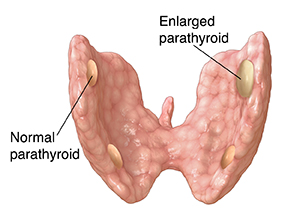Understanding Hyperparathyroidism
Understanding Primary Hyperparathyroidism

The job of PTH is to tell the body how to control calcium. Too much PTH means the body increases the amount of calcium in the blood. This leads to a problem called hypercalcemia. This is when the amount of calcium in the blood is too high. Hypercalcemia can cause serious health problems.
Causes
Hyperparathyroidism can occur when a parathyroid gland becomes enlarged. It can also occur as a complication of another health conditions, such as kidney failure or rickets. In these conditions, calcium is usually not high. This is called secondary hyperparathyroidism.
Who’s at risk
The risk factors for this condition include:
Being a woman (it’s less common in men)
Being older (it’s more likely to occur with age)
Having parents or siblings with the condition or other endocrine tumors
Having certain kidney problems
Taking certain medicines
Having had radiation treatment in the head or neck
Symptoms
Symptoms of the condition can include:
Muscle weakness
Depression
Tiredness
Confusion and memory loss
Poor memory
Nausea and vomiting
Pain in the stomach area (abdomen)
Hard stools (constipation)
Stomach ulcers
Need to urinate often
Kidney stones
Joint or bone pain
Bone disease (osteopenia or osteoporosis), an increase in bone fractures
High blood pressure
Increased thirst
Treatment
If primary hyperparathyroidism is not treated, it can get worse over time. Treatments include:
Surgery. This may be done to remove any enlarged parathyroid glands. This lets the amount of calcium in the blood go back to normal. You may need to take vitamin D and calcium supplements before the surgery. This will reduce the risk of low calcium after the surgery.
Medicine. This lowers the amount of parathyroid hormone made by the overactive glands.
You and your healthcare provider can discuss your treatment options. Make sure to ask any questions you have.
Updated:
March 21, 2017
Sources:
Up To Date. management of Primary Hyperparathyroidism
Reviewed By:
Freeborn, Donna, PhD, CNM, FNP,Hurd, Robert, MD